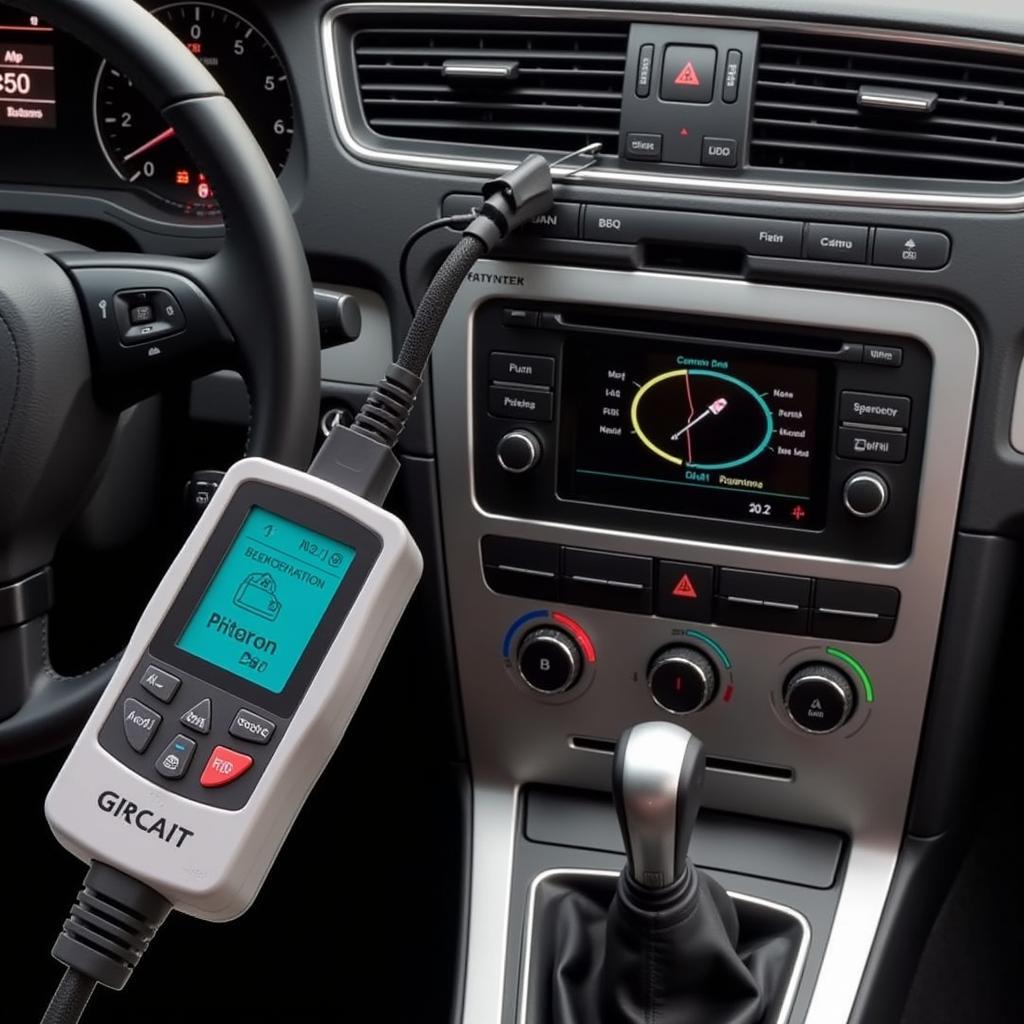The brake warning light on your Subaru Forester is a crucial safety feature, designed to alert you of potential issues within your braking system. Ignoring this light could lead to reduced braking performance and increase the risk of accidents. This comprehensive guide will delve into the common reasons behind the Subaru Forester brake warning light illuminating and provide effective solutions to address them.
Common Causes of a Subaru Forester Brake Warning Light
While a lit brake warning light can cause concern, it’s essential to understand that several factors can trigger it. Some are simple fixes, while others require professional attention. Here’s a breakdown of the most common culprits:
- Low Brake Fluid Level: The most frequent reason for the brake warning light is low brake fluid. This typically indicates a leak in your brake lines or a worn-out brake pad.
- Worn Brake Pads: Brake pads have wear indicators that make a squealing sound when they get thin. If ignored, this can lead to the metal backing plate contacting the rotor, triggering the warning light.
- Faulty Brake Light Switch: A malfunctioning brake light switch can prevent your brake lights from engaging when you press the pedal, leading to the warning light illuminating.
- ABS Issue: If your Subaru Forester’s Anti-lock Braking System (ABS) encounters a problem, it can also trigger the brake warning light. This could be due to a faulty sensor or a problem with the ABS module.
- Parking Brake Engaged: While seemingly obvious, sometimes drivers forget to disengage the parking brake fully, causing the light to stay on.
Troubleshooting Your Subaru Forester Brake Warning Light
Before heading straight to a mechanic, there are several checks you can perform yourself to potentially diagnose the issue:
-
Check Your Parking Brake: Ensure the parking brake is fully disengaged. Sometimes, even a slight engagement can trigger the light.
-
Inspect Brake Fluid Level: Locate the brake fluid reservoir under the hood. The reservoir should have “Min” and “Max” markings. If the fluid level is below the “Min” mark, it needs to be topped up. However, simply adding fluid without addressing the root cause of the low level is not a solution.
-
Listen for Unusual Noises: When applying the brakes, pay attention to any unusual sounds. A squealing or grinding noise often indicates worn brake pads.
-
Check Your Brake Lights: Have someone observe your brake lights while you press the brake pedal. If they don’t illuminate, the brake light switch might be faulty.
When to Seek Professional Help
If your initial troubleshooting doesn’t pinpoint the issue or you’re uncomfortable working on your vehicle’s braking system, it’s crucial to seek professional help.
“Brakes are not an area to gamble with,” says master mechanic John Davis, who has over 20 years of experience with Subaru vehicles. “Attempting complex repairs without proper knowledge and equipment can be dangerous. When in doubt, always consult a professional.”
2009 subaru forester brake warning light
Importance of Timely Repairs
Ignoring a lit brake warning light can lead to:
- Reduced Braking Performance: Low brake fluid or worn pads compromise your car’s ability to stop effectively, increasing stopping distances and the risk of accidents.
- Costly Repairs: Neglecting minor issues like worn pads can lead to more expensive repairs later, such as damaged rotors or calipers.
- Safety Hazards: A malfunctioning braking system poses a significant safety risk to you, your passengers, and other road users.
Preventing Future Brake Warning Lights
While some issues require professional attention, you can take steps to minimize the chances of the brake warning light illuminating:
- Regular Brake Inspections: Have your brake system inspected by a qualified mechanic at least once a year or as recommended in your Subaru Forester’s owner’s manual.
- Timely Brake Pad Replacement: Replace your brake pads as soon as they show signs of wear or according to your car manufacturer’s recommendations.
- Be Mindful of Driving Habits: Aggressive driving with frequent hard braking can wear down brake pads more quickly. Adopt smoother driving techniques to prolong their lifespan.
Conclusion
The brake warning light in your Subaru Forester serves as a vital safety indicator. Understanding the common causes behind its illumination and knowing how to respond can help you ensure your vehicle remains safe and reliable. Remember, timely maintenance and professional attention are crucial when dealing with brake system issues, providing peace of mind and a safer driving experience.
FAQs
Q: Can I drive my Subaru Forester with the brake warning light on?
A: While you might technically be able to drive a short distance, it’s highly discouraged. Driving with a compromised brake system is extremely dangerous. It’s best to diagnose and address the issue immediately.
Q: How often should I change my Subaru Forester’s brake fluid?
A: Subaru generally recommends changing your brake fluid every 30,000 miles or 24 months, whichever comes first. However, it’s best to consult your owner’s manual for specific recommendations for your model year.
Q: How much does it cost to fix a Subaru Forester brake warning light issue?
A: The cost can vary greatly depending on the underlying cause. A simple brake fluid top-up might cost under $50, while a complete brake job, including pads and rotors, can range from $300 to $800 or more, depending on the model year and labor costs.
2011 subaru foresrter brake warning light blinking
Q: Can I add any brake fluid to my Subaru Forester?
A: No, it’s crucial to use the brake fluid type specified in your Subaru Forester’s owner’s manual. Using the incorrect fluid type can damage your brake system.
Q: Does my Subaru Forester need a brake bleed after adding brake fluid?
A: If you’re simply topping up the brake fluid, bleeding the brakes is usually not necessary. However, if you’ve had a leak or any air has entered the system, bleeding the brakes is essential to ensure optimal performance.

